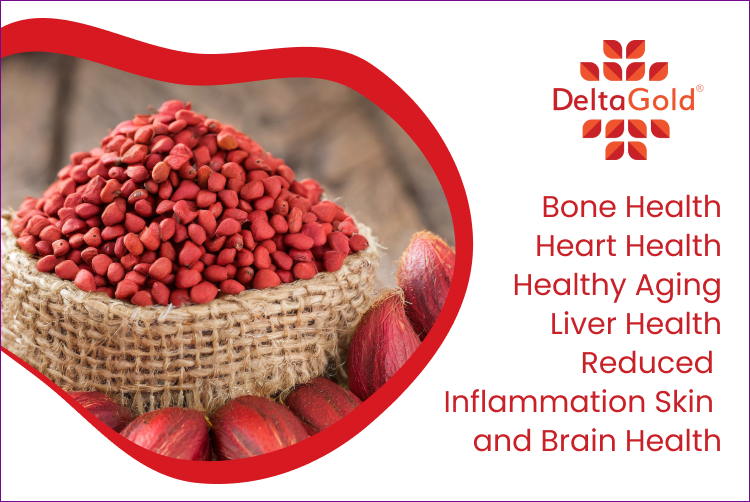ProQnol® is a brand of Coenzyme Q10 (CoQ10) supplement. CoQ10 is a naturally occurring compound in the body that plays a...

REDUCE STRESS
REDUCE STRESS
Stress is a natural response to the demands of everyday life, but chronic stress can negatively impact health, leading to many health problems, such as high blood pressure, heart disease, and depression.
Ingredients
Specialty
Ingredients
Specialty Ingredients
Goal OVERVIEW
The health goal of reducing stress is to foster physical, mental, and emotional well-being by minimizing the harmful impact of stressors on the body and mind. By implementing strategies that mitigate stress, individuals aim to enhance their overall quality of life, promote relaxation, improve cognitive function, boost immune system resilience, stabilize mood, and reduce the risk of stress-related health issues. This objective is pursued through various techniques such as mindfulness, exercise, relaxation practices, time management, and seeking social support, all collectively contributing to a balanced and harmonious lifestyle.
What You Should Know
Reducing stress is an ongoing process. At times, you feel more stressed than others. But by following lifestyle changes, you can learn to manage stress and improve your overall health. Identifying your stressors is the first step to reducing stress. Once you know your stressors, you can start developing strategies for coping with them by making lifestyle changes. There are a number of lifestyle changes you can make to reduce stress, such as exercising regularly, eating a healthy diet, getting enough sleep, avoiding caffeine and alcohol, spending time with loved ones, learning relaxation techniques, and seeking professional help
FOOD FOR THOUGHT
Did you know that spending time in nature, even for just a short period, has been scientifically proven to reduce stress levels? Research shows that natural environments can lower cortisol levels, enhance mood, and promote a sense of calm. So, whether it’s a leisurely walk in the park or a weekend getaway to the countryside, connecting with nature can offer a quick and effective way to alleviate stress and rejuvenate your mind and body.

SHAGANDHA® BY SABINSA
Shagandha® is a standardized powdered extract from the roots of Withania somnifera, commonly known as ashwagandha. Shagandha® offers various health benefits, including reducing stress, anxiety, and insomnia while improving cognitive function, reducing inflammation, and boosting the immune system. It is available in capsules, powders, and teas and is often used in herbal mixtures. Considered to be a breakthrough Adaptogenic.
Sponsored Content
FAQ
Several supplements have been studied for their potential to help reduce stress and promote relaxation. Remember that while these supplements may have some stress-reducing effects, they are not a substitute for proper stress management techniques, such as exercise, mindfulness, and stress-reduction strategies.
Here are some supplements that have been researched for their stress-reducing properties:
1. Ashwagandha:
- Ashwagandha is an adaptogenic herb that may help the body adapt to stress and promote a sense of calmness.
2. Rhodiola Rosea:
- Rhodiola is another adaptogenic herb that has been studied for its potential to reduce fatigue and stress.
3. L-Theanine:
- L-theanine is an amino acid found in tea leaves. It may have calming effects and can be found in supplement form.
4. Magnesium:
- Magnesium is involved in muscle relaxation and stress response. It may promote relaxation and improve sleep quality.
5. Valerian Root:
- Valerian root is an herbal supplement traditionally used to support relaxation and sleep.
6. Passionflower:
- Passionflower is an herbal remedy that may help reduce anxiety and promote relaxation.
7. Chamomile:
- Chamomile is often consumed as a tea known for its calming effects.
8. B Vitamins:
- B vitamins, particularly B6, B9 (folate), and B12, are important for nervous system health and help manage stress.
9. Omega-3 Fatty Acids:
- Omega-3s in fatty fish and supplements may have anti-inflammatory effects that indirectly support stress reduction.
10. GABA (Gamma-Aminobutyric Acid):
- GABA is a neurotransmitter that plays a role in calming the nervous system. GABA supplements are available.
11. Melatonin:
- Melatonin is a hormone that regulates sleep-wake cycles. It may help improve sleep quality and reduce stress.
12. Lavender:
- Lavender oil and supplements may have relaxing and anxiety-reducing effects.
13. Vitamin D:
- Vitamin D deficiency has been linked to mood disorders. Ensuring adequate vitamin D levels indirectly supports stress management.
It’s important to note that individual responses to supplements can vary, and not all supplements will work for everyone. Additionally, supplements should be used with healthy lifestyle practices and stress-reduction techniques. If you’re considering using supplements to help manage stress, it’s a good idea to consult a healthcare professional before starting any new regimen. They can provide personalized guidance based on your health status and needs.
Coping with stress involves adopting a combination of healthy strategies that help you manage and reduce the impact of stress on your physical and mental well-being.
Here are some effective ways to cope with stress:
1. Practice Mindfulness and Meditation:
- Mindfulness involves staying present in the moment and can help you manage stress by reducing rumination and promoting relaxation. Meditation techniques like deep breathing and guided imagery can also help calm your mind.
2. Engage in Regular Physical Activity:
- Exercise is a powerful stress reducer. It releases endorphins, natural mood lifters, and helps regulate stress hormones.
3. Maintain a Balanced Diet:
- Nutrient-rich foods support overall well-being and can have a positive impact on mood. Avoid excessive caffeine and sugary foods, as they can contribute to mood swings.
4. Get Adequate Sleep:
- Prioritize 7-9 hours of quality sleep per night. Sleep is crucial for managing stress and maintaining mental clarity.
5. Establish a Routine:
- Creating a daily routine can provide structure and a sense of control, which can help reduce stress.
6. Practice Relaxation Techniques:
- Deep breathing and progressive muscle relaxation can help you relax and alleviate stress.
7. Connect with Supportive People:
- Talk to friends, family, or a counselor about your stressors. Social support can provide perspective and emotional relief.
8. Set Realistic Goals:
- Break down tasks into manageable steps and set achievable goals. This can prevent feeling overwhelmed.
9. Engage in Hobbies:
- Pursue activities like reading, painting, gardening, or playing a musical instrument. Hobbies can be a healthy outlet for stress.
10. Limit Stressors:
- Identify sources of stress in your life and consider ways to minimize or eliminate them. This might involve setting boundaries, delegating tasks, or simplifying your commitments.
11. Practice Time Management:
- Prioritize tasks and create to-do lists. Efficient time management can reduce stress related to feeling rushed or overwhelmed.
12. Practice Gratitude:
- Focus on the positive aspects of your life. Gratitude can shift your perspective and improve your mood.
13. Limit Technology and Screen Time:
- Take breaks from screens and engage in activities that allow you to unplug and relax.
14. Laugh and Have Fun:
- Laughter has been shown to reduce stress and increase feelings of happiness. Engage in activities that make you smile.
15. Seek Professional Help:
- If stress becomes overwhelming or chronic, consider speaking to a mental health professional who can provide guidance and support.
Remember that coping with stress is a personal journey, and finding the best strategies for you may take time. Experiment with different techniques and prioritize self-care to build resilience and effectively manage stress.
Long-term or chronic stress can have a profound impact on both your physical and mental health. Over time, persistent stress can lead to a range of negative consequences that affect various systems in the body.
Here are some of the potential long-term effects of chronic stress:
1. Cardiovascular Health:
- Chronic stress can contribute to high blood pressure, increased heart rate, and a higher risk of heart disease. It may also contribute to the development of atherosclerosis (narrowing of arteries) and increase the risk of heart attacks and strokes.
2. Immune System Suppression:
- Prolonged stress can suppress the immune system, making you more susceptible to infections illnesses, and slower wound healing.
3. Digestive Issues:
- Chronic stress may lead to gastrointestinal problems such as irritable bowel syndrome (IBS), indigestion, or inflammation in the gut.
4. Weight Gain and Obesity:
- Stress can trigger emotional eating and lead to weight gain, especially around the abdomen. It can also affect metabolism and contribute to obesity over time.
5. Hormonal Imbalances:
- Chronic stress can disrupt hormonal balance, affecting sex hormones, thyroid hormones, and the stress hormone cortisol. This can lead to reproductive issues, mood swings, and energy imbalances.
6. Mental Health Conditions:
- Long-term stress is a risk factor for developing or exacerbating mental health disorders such as anxiety and depression. It can also increase the risk of developing chronic conditions like burnout.
7. Sleep Disruptions:
- Chronic stress can lead to sleep problems, including insomnia and disrupted sleep patterns, further contributing to stress and affecting overall health.
8. Cognitive Impairment:
- Prolonged stress may impair cognitive function, affecting memory, attention, and decision-making abilities.
9. Musculoskeletal Issues:
- Stress can lead to muscle tension, pain, and headaches and contribute to the development of chronic pain conditions.
10. Skin Problems:
- Stress can exacerbate skin conditions such as eczema, psoriasis, and acne. It can also contribute to premature aging and slower wound healing.
11. Reproductive Health Issues:
- Chronic stress can impact reproductive health by affecting fertility, libido, and menstrual cycles in both men and women.
12. Accelerated Aging:
- Chronic stress is associated with accelerated cellular aging, affecting overall health and increasing the risk of age-related diseases.
13. Altered Eating Patterns:
- Stress can lead to unhealthy eating patterns, including overeating or undereating, contributing to nutritional imbalances and health issues.
It’s important to recognize chronic stress signs and manage them effectively to prevent these long-term consequences. Implementing stress management techniques, adopting a healthy lifestyle, seeking support when needed, and practicing self-care can help mitigate the negative effects of stress and promote overall well-being. If you find that chronic stress impacts your health and daily life, consider seeking guidance from a healthcare professional or mental health specialist.
A wide range of factors can cause stress, and what triggers stress can vary from person to person. Stressors can be external events, situations, or internal thoughts and emotions that challenge your ability to cope effectively.
Here are some common causes of stress:
1. Life Transitions:
- Major life changes, such as moving, starting a new job, getting married, or having a child, can bring about stress due to their adjustments and uncertainties.
2. Workplace Stress:
- High workloads, tight deadlines, interpersonal conflicts, job insecurity, and excessive demands can contribute to stress.
3. Financial Concerns:
- Money-related stressors, such as debt, financial instability, or job loss, can cause significant stress.
4. Family Issues:
- Family conflicts, caregiving responsibilities, parenting challenges, and relationship problems can lead to stress.
5. Health Challenges:
- Dealing with chronic illnesses, acute health issues, or concerns about one’s health can be a source of stress.
6. Academic Pressure:
- Students may experience stress due to academic demands, exams, deadlines, and the pressure to perform well.
7. Social Isolation:
- Feeling disconnected from social support networks or lacking a strong support system can contribute to stress.
8. Traumatic Events:
- Experiencing or witnessing traumatic events, such as accidents, violence, or natural disasters, can lead to stress and even post-traumatic stress disorder (PTSD).
9. Environmental Factors:
- Environmental stressors, such as noise, pollution, and overcrowding, can impact overall well-being.
10. Personal Expectations:
- Setting high expectations for oneself or feeling pressure to meet certain standards can lead to stress.
11. Lack of Work-Life Balance:
- Struggling to balance work, family, and personal life can cause stress.
12. Unrealistic Time Management:
- Overcommitting or struggling to manage time effectively can lead to stress due to feeling overwhelmed.
13. Uncertainty and Ambiguity:
- Facing uncertainty about the future, making major decisions, or dealing with ambiguous situations can be stress-inducing.
14. Social Pressures:
- Societal expectations, cultural norms, and peer pressures can contribute to stress.
15. Negative Thinking Patterns:
- Chronic negative thought patterns, excessive worry, and anxiety can lead to ongoing stress.
It’s important to note that not all stress is negative. Some stress can be motivating and drive you to perform at your best. However, chronic stress that goes unmanaged can negatively affect your physical and mental health. Recognizing your stressors and finding effective coping methods is crucial for maintaining overall well-being. If stress significantly impacts your life, consider seeking support from a healthcare professional or mental health specialist.
Stress can be categorized into different types based on its sources, duration, and effects on an individual’s well-being.
Here are some of the main types of stress:
1. Acute Stress:
- Acute stress is short-term stress that arises in response to immediate challenges or situations. A deadline, an argument, or a sudden, unexpected event often triggers it. Once the stressor is resolved, the body’s stress response returns to normal.
2. Chronic Stress:
- Chronic stress is long-term stress that persists over an extended period. It can result from ongoing difficulties, such as financial problems, relationship conflicts, or work-related stressors. Chronic stress can have significant negative effects on physical and mental health.
3. Episodic Acute Stress:
- Episodic acute stress occurs when individuals frequently experience acute stressors. People who are “chronically stressed out” and constantly facing various challenges may develop episodic acute stress. This can lead to a cycle of ongoing stress and poor coping.
4. Environmental Stress:
- Environmental stress is caused by external factors such as noise, pollution, crowding, or other physical conditions that can contribute to feelings of discomfort and unease.
5. Psychosocial Stress:
- Psychosocial stress is related to interpersonal relationships, social pressures, and emotional challenges. It can arise from conflicts with others, societal expectations, or personal identity issues.
6. Work-Related Stress:
- Job-related demands, pressures, and challenges trigger work-related stress. High workloads, time pressures, conflicts with colleagues, and job insecurity can contribute to work-related stress.
7. Acute Traumatic Stress:
- Acute traumatic stress occurs after exposure to a traumatic event, such as an accident, natural disaster, or violent incident. Symptoms may include shock, emotional numbness, and difficulty coping with the event’s aftermath.
8. Chronic Traumatic Stress (Post-Traumatic Stress Disorder, PTSD):
- PTSD is a specific stress response that occurs after a traumatic event. It involves experiencing distressing symptoms like flashbacks, nightmares, avoidance behaviors, and hyperarousal.
9. Physical Stress:
- Physical stress is the strain on the body due to illness, injury, intense physical activity, or lack of sleep. Physical stressors can trigger the body’s stress response.
10. Emotional Stress:
- Emotional stress arises from feelings of overwhelm, anxiety, sadness, or other intense emotions. It can result from personal issues, difficult life events, or mental health challenges.
11. Cognitive Stress:
- Cognitive stress is related to excessive worry, rumination, and negative thought patterns. It can lead to mental exhaustion and impact decision-making.
12. Anticipatory Stress:
- Anticipatory stress is the stress experienced in anticipation of a future event or situation. It can be triggered by performance anxiety, public speaking, or upcoming challenges.
13. Financial Stress:
- Financial stress is caused by money-related concerns, such as debt, job loss, or inability to meet financial obligations.
It’s important to recognize the type of stress you’re experiencing and its impact on your life. Effective stress management techniques can help you cope with stress, regardless of its type. If stress significantly affects your well-being, consider seeking support from a healthcare professional or mental health specialist.
Related Videos
Articles
The optimal Bacopin® dosage is a popular topic among individuals interested in its cognitive benefits. Discovering the optimal dosage and...
AstraGin®, is a patented, all-natural compound composed of highly purified saponins from Astragalus membranaceus and Panax notoginseng. The standout feature...

















